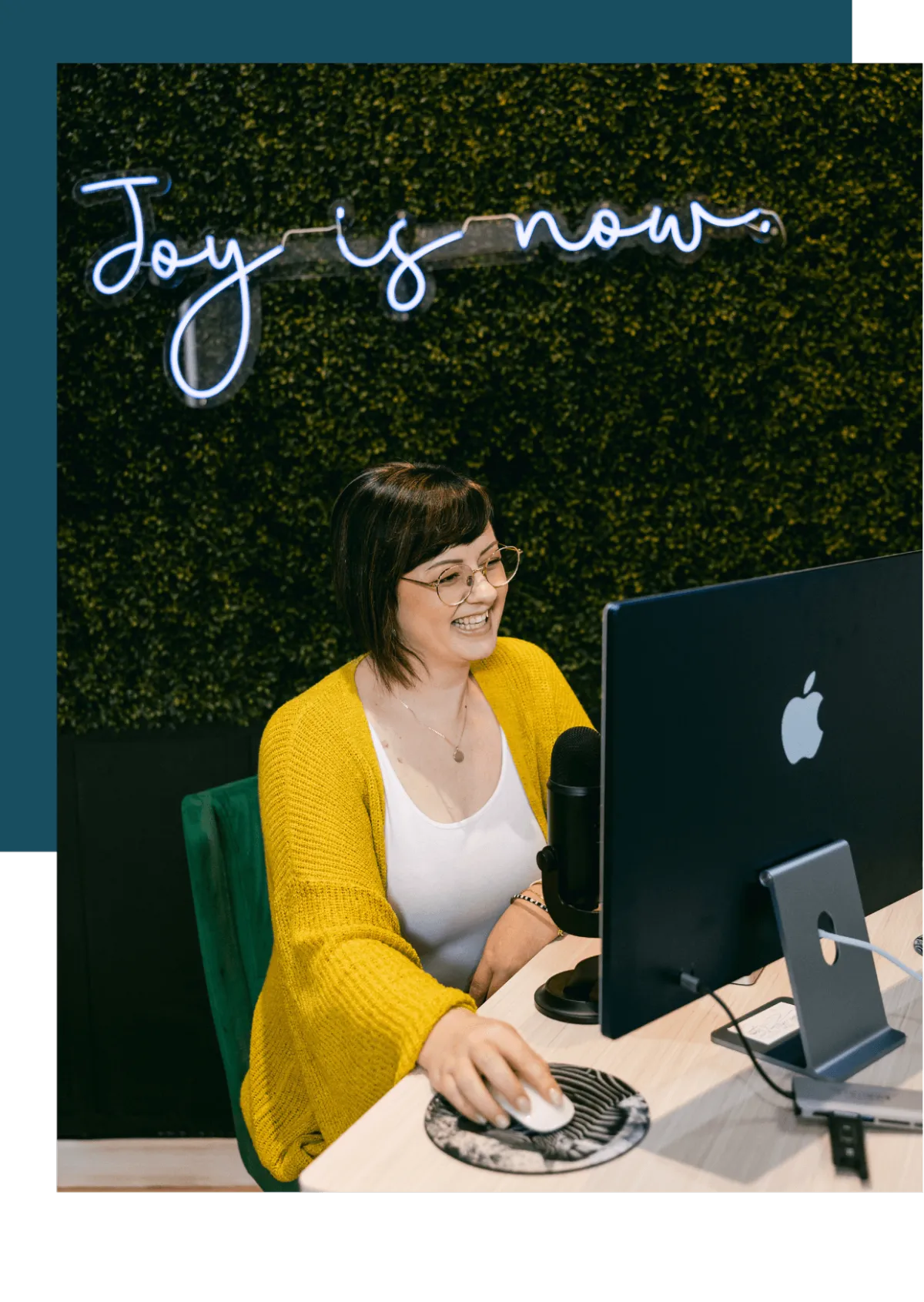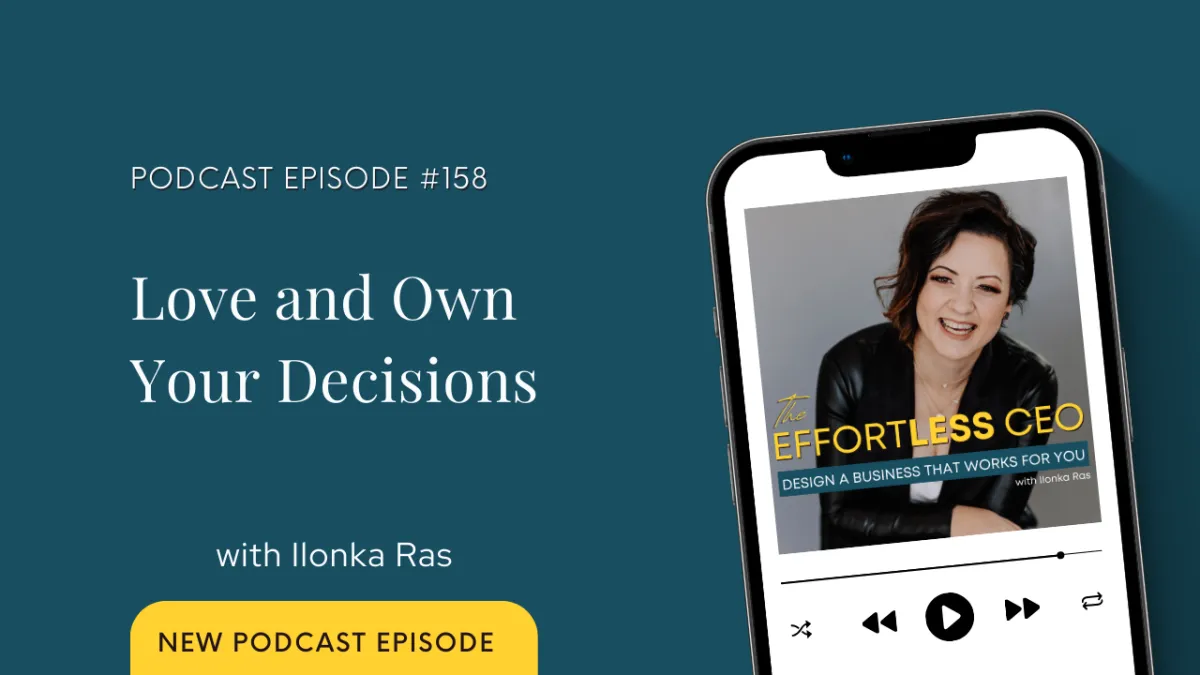
The EffortLESS CEO Podcast
Your weekly dose of actionable strategies for working less and living more.
The EffortLESS CEO Podcast
Your weekly dose of actionable strategies for working less and living more.

Grab your earphones and join me in conversation...

Ep #158 Love and Own Your Decisions
Did you know you can also watch this episode on YouTube?
Decisions are a natural part of life and business. We’re constantly choosing things. We’re not necessarily always intentional about the choices we make.
We tend to really consider our decisions when we classify it as a big decision with big impact. Like buying a new car or buying a house, marrying someone. Hiring a new team member. These big decisions stress us out way more than say choosing what we’re going to have for dinner or choosing what movie to watch next on Netflix.
I coach my clients a lot on making decisions, and one of the biggest misconceptions I see is people think there is a right decision to make. One perfect decision. And they are very focused on finding and making the right decision not wanting to make the wrong choice.
And they will spin in this confusion thinking that there is a right choice, often choosing something and then instead of committing to that decision and seeing it through, they uncommit and change their decision. Then the doubt kicks in and they spin again…they change the decision again.
Believing that there is one perfect option creates a lot of pressure and worry. Worrying that you’re going to regret this decision.
In the perfect world we would love to have the ability to see what’s behind door A and door B. We want to know exactly how this decision is going to play out ahead of time so that we can safeguard ourselves from regret.
Some of the ways I see this showing up for my clients is when they ask me how I think they should price their services (should I charge by the hour or should I have a flat fee). Should I hire this team member, should I invest in this software, should I add this service to my offer suite.
In most cases, the options they have in front of them are endless. There are many different options and things they could choose. Which often creates more overwhelm because they want to analyse every possible choice. And this isn’t always possible or even the best use of their time.
There really is no right or best or perfect decision.
There are different decisions with different results.
Something else I see in my clients a lot is how they treat themselves after making a decision that didn’t create what they expected. Shaming themselves and telling themselves that I should have done something different, made a different decision. This is very disempowering and just creates more pressure and fear around decisions.
Every decision you make does have an impact. It creates a result. Sometimes the decision creates the result you want and sometimes it doesn’t. And we often stall making decisions because we’re focused on getting an outcome or creating a result we don’t want.
Loving Your Decisions
Making a decision on anything really boils down to having information. Whenever we need to make a choice, and do it intentionally, we want to gather as much information as we need to make that decision. The thing is…your brain will always want more information. It will never be satisfied with the information you have because it wants that certainty. It wants to know exactly what’s behind every door.
So at some point you’re going to have to trust that you have all the information you need and then commit to making the decision.
Once you’ve made the decision, you need to sell yourself on why you love that decision. Why this is the best decision for you in this specific situation.
So it’s not about making the right decision, it’s about making a decision and then making it right. You want to sell yourself on why this decision is the right decision. You are actively choosing it. Over and over again. So when doubt sets in, you want to sell yourself again on why you made that decision in the first place.
You can ask yourself:
Why do I love this decision?
Why is this the best decision for me right now?
Owning Your Decisions
Once you’ve made a decision. It’s yours. You own it. Regardless of the outcome. It’s so easy for us to be hard on ourselves when a decision doesn’t pan out the way we hoped or expected. We blame ourselves, sometimes we forget that WE made the decision and we blame others.
So just notice how you treat yourself on the backend of your decisions. If you made that decision intentionally (in other words you gathered the information and you sold yourself on why this decision was the best move at that moment) then don’t beat yourself up for things not working out as you hoped.
You made the best decision you could with the resources, experience, and awareness you had at the time.
And even if you didn't make the decision intentionally…take responsibility for it. You still made a decision. Owning your decisions is a lot more empowering than blaming outside circumstances for the decision you made. Also, just know that some situations, no matter how much you prepare, will still catch you off guard.
Use whatever the outcome is (good or bad) to learn and improve.
So, when you’re faced with your next big decision:
Gather the information
Make your decision
Sell yourself on why you love that decision
Take ownership of it
Learn from your experience and be kind to yourself on the other side of it.
See you next week!
Do you have a question on designing a business that can run smoothly with or without you?
Send me an email at ilonka@ilonkaras.com and I will answer it in the next episode.
If you found this helpful. Share it with a friend in business and let’s help each other grow.
Did you miss last week's episode? - Catch up HERE
If you found value from the podcast, subscribe so you never miss out on a new episode!
Leave us a positive review here and help us reach and help more business owners.
ilonkaras.com | Ilonka Ras Coaching Pty Ltd
All Rights Reserved


